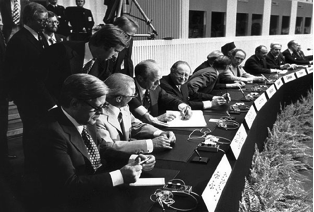A new security and defense policy for Spain, 1975-1988: A)The Conference on Security and Cooperation in Europe (CSCE)
This week, in WithTheVoices, Francisco J. Rodrigo, is going to tell us about the “new security and defense policy for Spain” right after Franco’s death and during the Transition period (more concretely, between 1975 and 1988). Hereby you can find the first of the three texts elaborated by our collaborator.
The forging of a new security and defense policy was one of the most important profiles of the new and democratic Foreign Action of Spain. First of all, in this article we will study the Spanish participation in the follow-up post-Helsinki meetings of the Conference on Security and Cooperation in Europe in Belgrade (1977-1978) and, particularly in Madrid (1980-1983), because Spain was the host country. Then, we will go through about Spain’s entry into NATO, which was the main element of change and one of the most controversial topics in this new security and defense policy. Furthermore, this issue will lead to the following two points: the negotiations to renew the defense agreements with the USA, and the internationalization and civilian control of the Spanish Armed Forces, a primary goal of this new policy. Last but not least, we will see how Spain entered the Western European Union, European organization of defensive nature, in 1988.

The Conference on Security and Cooperation in Europe. From Helsinki to Madrid (1973-1983). A multi-dimensional approach to security.**
The military agreement with the United States and the Concordat with the Holy See in 1953, as well as the entry of Spain in the United Nations in 1955 broke the international isolation of Franco’s regime. However, the Spanish government was subjected to ostracism by the international community because of the dictatorial nature of its political regime. Years later, Madrid reacted with great joy when the Communist countries invited Spain to participate in the future Conference on Security and Cooperation in Europe (CSCE) through the Budapest Appeal in 1969.
The first meeting of the CSCE (currently OSCE) was the Helsinki Conference, held between 1973 and 1975. It was representative of a comprehensive and multi-dimensional approach to security, covering the fields of political-_military_, economic and environmental and human contacts. The main goal for Spain at the Helsinki Conference was to break the international ostracism suffered because of the dictatorship. The Spanish delegation took an active part in that meeting. In fact, the Prime Minister Carlos Arias Navarro participated in the third phase, in Finland’s capital, to sign the Final Act of the CSCE. This document sanctioned the territorial statu quo in Europe emerged after 1945, allowing the peaceful change of borders, and the respect for Human Rights, something which was crucial to the emergence of dissident groups in Eastern Europe.
After being elected as the host country at the previous Conference in Belgrade (1977-1978), the CSCE in Madrid began in September 1980 in the capital of Spain with the preparatory meetings. The process born in Helsinki was seriously endangered by the fiasco of Belgrade and the end of détente between blocks. Why was this Conference important for Spain? Because it was the host country, and because it belonged for the first time to the Western group in the CSCE, qualified as a “test” of intention to enter NATO. That confirmed Spain as a Western democracy.
A political change in Spain brought the Socialist Party of Felipe González to power in October 1982. NATO reservations by the new Government made possible to Spain to have a more mediation capacity. In fact, Felipe Gonzalez introduced the definitive proposal in June 1983. Then, the Final Mandate of the Madrid Conference (September 1983) caused a significant progress in comparison to watching the Helsinki Final Act, such as the first international condemnation of terrorism (proposed by Spain), a support for freedom of association (coinciding with the struggle between the communist dictatorship in Poland and the Solidarity independent trade union), and the defense of religious freedom.
Francisco José Rodrigo Luelmo